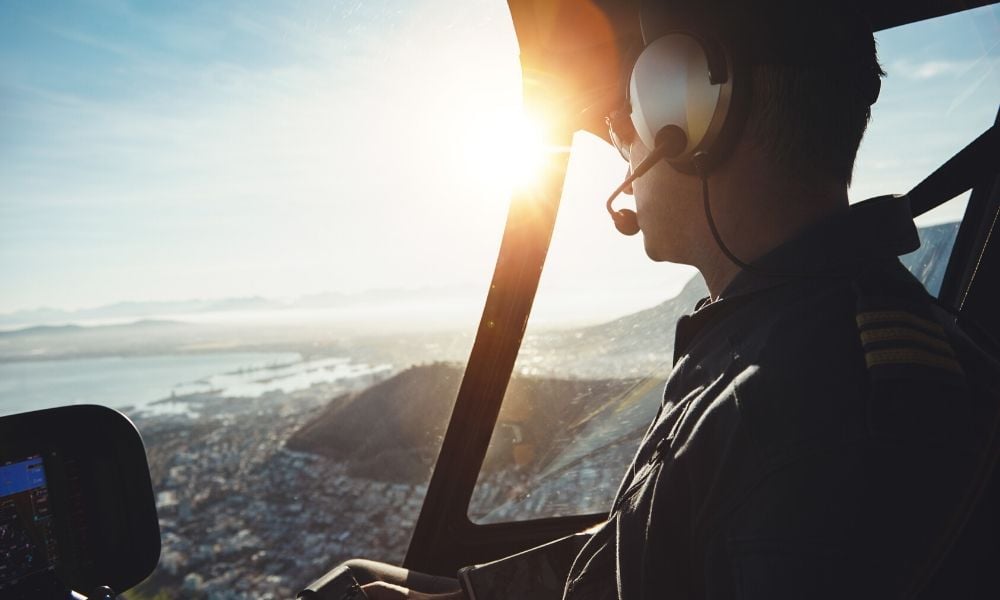
Piloting a helicopter requires a coordinated combination of mental aptitude and physical skill. With so many factors influencing the outcome of a flight, helicopter pilots must prepare and focus their attention. Here are five essential helicopter pilot safety tips that you should remember to help you be a safer pilot.
1. Check Yourself, Before You Wreck Yourself
The most important element of any flight is you—the pilot. As the pilot in command, it is under your authority, and therefore your responsibility, to ensure you operate the aircraft safely and according to all applicable rules and regulations. Before a flight even begins, it is imperative to ensure that you, yourself, are ready for flight. One such self-check that you should use is the IMSAFE checklist. IMSAFE stands for Illness, Medication, Stress, Alcohol (or Drugs), Fatigue, and Emotions. The IMSAFE checklist provides you with a quick list of factors with criteria that you can use for self-evaluation. If any area does not meet a specific standard, you should consider canceling the flight, as your piloting abilities may become compromised.
2. Don’t Skimp on the Preflight Inspection
The second most important element of the flight is the aircraft. One of the most important tasks any pilot must perform is a preflight inspection of their aircraft. It’s easy to get complacent and take shortcuts during (or completely skip) the preflight inspection. Don’t get lazy! Every aircraft should have an associated preflight inspection checklist. Use it. Make certain that you review any maintenance records, performance charts, and all other documents prior to the flight. You may be on your fifth flight of the day; however, don’t let the fifth preflight inspection become any less important than the first.
3. Consider the Mission
What is the purpose of your flight? Is it a training flight? Do you have a specific destination that you need to reach? The flight environment is very dynamic. Understanding why you’re flying in the first place will help inform your aeronautical decision making. There are many elements to consider when planning a flight such as a route and an altitude selection. The weather conditions will have a heavy influence on your mission. Get a standard weather briefing to aide in making a go or no-go decision. If you are flying and conditions take a turn for the worse, don’t push it. Your best option may be to turn around or, in a worst-case scenario, land in an open field or empty lot. Be prudent and don’t put yourself or passengers at risk just to complete a flight.
4. Respond, Don’t React
In a perfect scenario, a perfect pilot should be able to understand all the elements that can affect their flight and avoid the circumstances that lead to tough decisions. But we’re not perfect. Good aeronautical decision-making means that you can recognize the changes to our environment, effectively analyze its effects, and ultimately reach a decision that keeps you and your aircraft safe. A good pilot responds to these changes—they don’t react. Reacting to a situation without first thinking about it could be worse than doing nothing at all. Find a systematic approach that allows you to think through anything thrown at you before deciding on how to respond.
5. Share Your Experiences
One of the greatest resources available to you is other pilots. Learn from others and share your own experiences. Most importantly, don’t be afraid to share your mistakes. Learn from them. Learn from the mistakes made by others. We’re only human after all. Pilots almost always immediately recognize when they make a mistake. But mistakes only become lessons learned when we share and discuss them. Telling stories of what you messed up, learned, or discovered about flying helicopters will benefit you and your fellow pilots. It may even help someone else before they end up in a difficult situation.
Hillsboro Aero Academy offers a helicopter training program approved by the Federal Aviation Administration. We designed the program to provide you with the training needed to prepare you for a career as a pilot in the aviation industry. If you are looking for a helicopter pilot school to help you learn and hone these safety skills along with many other piloting skills, contact us today. We can tell you more about our school and the career paths available to you as a helicopter pilot.
